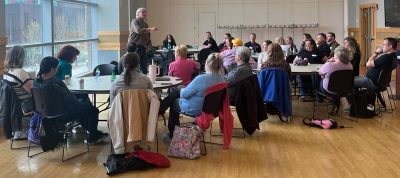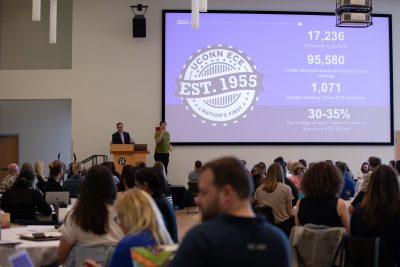By Christopher Todd
Recently, an October 2024 edition of “Education Week” focused primarily on what the magazine referred to as “The High School Handoff”, highlighting what happens to students after high school and what some schools and districts across the nation are doing to invest in new pathways, grading and innovative teaching approaches. Not surprisingly, within the volume readers will find numerous references to, and highlights of, Dual Credit and career-based opportunities. With nearly 2.5 million students engaged in dual credit programs nationwide, dual credit programming has become an increasingly recognized and integral component of the changing educational landscape.
As both Dual Enrollment (high school students on college campus) and Concurrent Enrollment (high school instructors teaching college courses) begin to accelerate within national educational discourse, concurrent enrollment is not new, nor obscure to Connecticut, whose UConn’s Early College Experience (ECE) program is nationally recognized as the oldest program in the nation1. Educators and school leaders across the state know that these programs bridge the gap between high school and college, offering students a head start on higher education and fostering a smoother transition to postsecondary success. Additionally, UConn coursework through the ECE program allows students to explore career pathways, build critical foundations of content and knowledge and enter the postsecondary space better prepared to meet the challenges ahead.
To maximize the potential of UConn ECE, stakeholders—including our educators, school leaders, and university faculty and staff—play critical roles in ensuring program quality, accessibility, and effectiveness. Focused on Expanding Access, Seamless Registration and Celebrating Success, the following excerpts highlight 3 partner schools working to enhance their connection to the UConn Early College Experience.
1 Check out the incredible article, “Formative Threads in the Tapestry of College Credit in High School: An Early History of the Development of Concurrent Enrollment and a Case Study of the Country’s Oldest Program” written by ECE Staff and Community members, Carissa Rutkauskas and Kathrine Grant in the first edition of the Concurrent Enrollment Review (CER): https://surface.syr.edu/cer/vol1/iss1/3/
Expanding Access: Norwich Free Academy
Stephani Jones, Director of Curriculum and Instruction
Since 1856, Norwich Free Academy (NFA) has adhered to its mission to “return to our hamlets and our homes its priceless freight of youthful minds, enriched by learning… and prepared for the highest usefulness and the purest happiness.” With over 2000 students from a multitude of towns and nations, we celebrate our diversity and endeavor in the creation of opportunities to fulfill our historic mission.
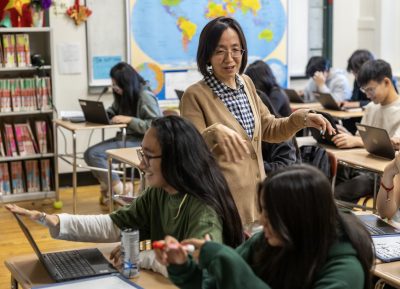
The intent behind the expansion of our dual enrollment program was twofold: to increase both our course offerings and student access to the UConn ECE experience. With a robust course catalog and the support of the UConn ECE team, we were able to identify existing overlap between NFA and UConn ECE courses. This allowed us to target departments with fewer UConn ECE offerings while simultaneously increasing the numbers in other content areas. As a result, we added eleven new courses, including the high interest Intro to Allied Health Professions (AH 1100), Contemporary Social Issues in Sport (EDLR 2001), and Exercise and Wellness for Everyone (KINS 1100).
We begin our course selection process with an “Exploring Opportunities” event which provides students the opportunity to visit teachers, learn about classes, and have their questions answered by representatives from the UConn ECE team. During this time, we coach students, especially those who have received a Rigorous Coursework letter, to register for challenging courses like our UConn ECE offerings. This year we increased our outreach to ensure that all students and families have the necessary support for completing the UConn ECE registration process. The addition of new courses, the targeted coaching, outreach and support led to a 40% increase in students registered for UConn credits.
Seamless Registration Practices: Suffield High School
Gina Garfield, School Counselor/6-12 Team Leader
On September 16, 2024, Suffield High School held its second annual ECE Registration Day, with Todd Blodgett, Registration Coordinator for Early College Experience, joining us. The event was both informative and highly productive!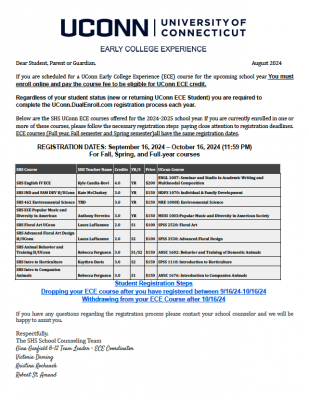
The day is carefully organized to run smoothly. A schedule is shared in advance with ECE teachers, informing them of the time their class will come to the Library Media Center and preparing them for the registration process. During the 7-period day, each class comes downat their scheduled time with their ECE teacher. Some periods have more than one class, so it’s important to have additional school counselors available to support the process. Students are greeted by the four school counselors and Todd, and we walk them through the registration process step by step, troubleshooting as needed. Additionally, second-semester students are registered by scheduling them during a period as well, making sure all ECE students are included in the process.
On registration day, we cross-reference printed class rosters with the ECE rosters in the registration system as students come in to confirm that all students who need to be registered are accounted for. We also leave 7th period open to catch any students who missed their session—whether due to lateness or another reason— and call them to the Library Media Center for registration.
By the end of ECE Registration Day, 95% of students were successfully registered, with only seven requiring follow-up due to absences. Having Todd on-site was invaluable, as it allowed counselors to refine troubleshooting techniques and resolve issues on the spot. We were able to meet with the remaining students the next day, achieving 100% registration by 9/17. Students also provided positive feedback, with many saying the process was much more efficient and helpful for them.
We look forward to using the same process next year, as it has really helped organize our registration programming, resolve issues on the spot, and strengthen our positive collaboration with UConn, all in support of our students!
Celebrating Student Success: New Britain High School
As New Britain High School works to expand student access to dual credit opportunities, including 17 UConn courses, a key building strategy has been intentionally focused on the celebration of student success. UConn ECE Site Representative Eileen Marquez collaborated with New Britain High School Guidance Counselor Stacy Rosado and her team to lead school staff in implementing 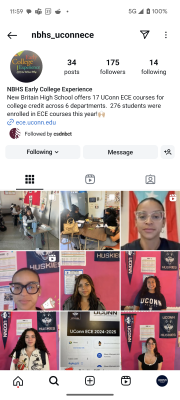 several promising practices to celebrate the work and dedication of their students, starting with a first ever college credit ceremony held last May. The ceremony celebrated the efforts of more than a hundred students who participated in dual credit coursework through one of New Britain’s various higher education partnerships, including UConn ECE.
several promising practices to celebrate the work and dedication of their students, starting with a first ever college credit ceremony held last May. The ceremony celebrated the efforts of more than a hundred students who participated in dual credit coursework through one of New Britain’s various higher education partnerships, including UConn ECE.
In reflecting on the event, Todd Blodgett said “It was a great evening attending the first New Britain High School College Credit Recognition Ceremony. I was able to talk with many of the graduating students who took UConn Early College Experience courses while at New Britain and hear about their future plans. The school and counseling office put on a wonderful event for families to come honor their students who have challenged themselves to take college credit courses while at New Britain High School.”
In addition to the first annual celebration, New Britain High School has also worked to leverage their UConn ECE Student Ambassadors to celebrate dual and concurrent enrolled students through various social media platforms, including their @nbhs_uconnece Instagram account.
Eileen wrote “Our student ambassadors have been doing an excellent job showcasing the course highlights, interviewing students, and posting individual student accomplishments. They receive support from the social media managers for our high school and district pages who always showcase what they post on the @nbhs_ uconnece Instagram as well.”
These promising practices to intentionally expand access, streamline student registration, and celebrate student success represent just a small sample of the incredible initiatives taking place across the UConn ECE community. These exemplary practices expand on our May 2024 Site Representative Conference highlights of the incredible initiatives happening in Glastonbury, Rockville, East Lyme, and at University High School of Science and Engineering where each partner school is intentionally focused on building programming that best supports student success and postsecondary aspirations.
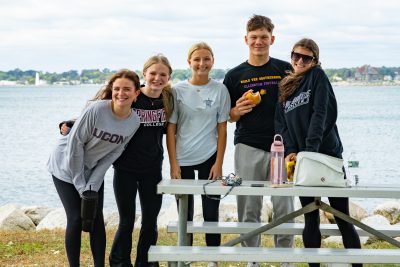 instructors from 12 different UConn ECE high school partners from across the state. We were also joined by UConn Avery Point and Storrs Administrators, faculty, and staff, and a very special Guest of Honor, Jonathan XV!
instructors from 12 different UConn ECE high school partners from across the state. We were also joined by UConn Avery Point and Storrs Administrators, faculty, and staff, and a very special Guest of Honor, Jonathan XV! 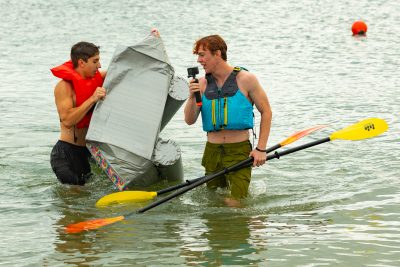
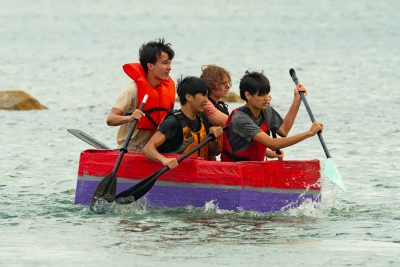 These sessions helped students dive deep into the academic topics related to maritime studies, engineering, and more setting them up for the afternoon’s hands-on competition.
These sessions helped students dive deep into the academic topics related to maritime studies, engineering, and more setting them up for the afternoon’s hands-on competition. 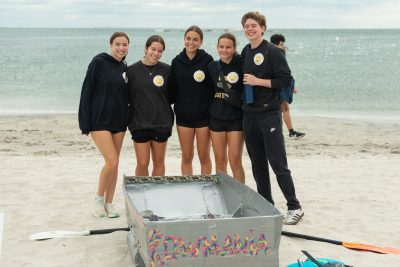 and The Morgan School placed in two of the four heats, Daniel Hand High School broke their streak and brought home the Cardboard Trophy as the winners of the Championship Race! Daniel Hand High School’s Usain Boat set the record for the fastest completion time during the initial heats, and then took first in the Championship race as well. They will display the Cardboard Trophy until next year, when a plaque with their school and boat name will be affixed to the trophy, and then be passed along to the 2025 Champions!
and The Morgan School placed in two of the four heats, Daniel Hand High School broke their streak and brought home the Cardboard Trophy as the winners of the Championship Race! Daniel Hand High School’s Usain Boat set the record for the fastest completion time during the initial heats, and then took first in the Championship race as well. They will display the Cardboard Trophy until next year, when a plaque with their school and boat name will be affixed to the trophy, and then be passed along to the 2025 Champions!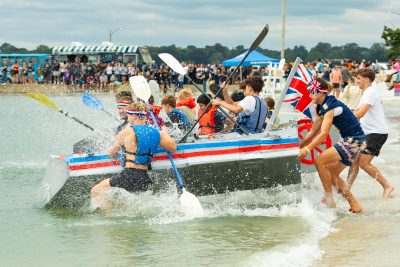
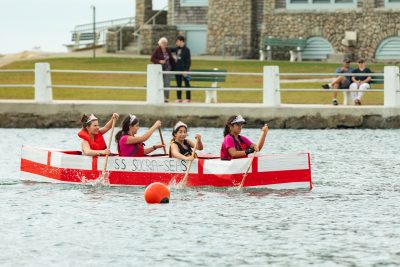
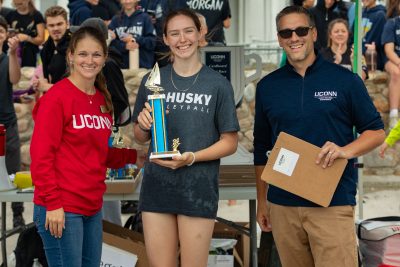
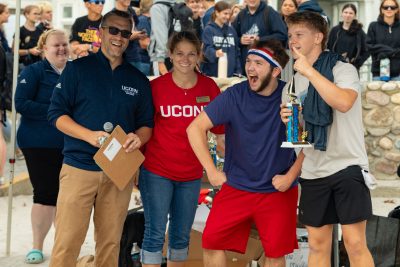
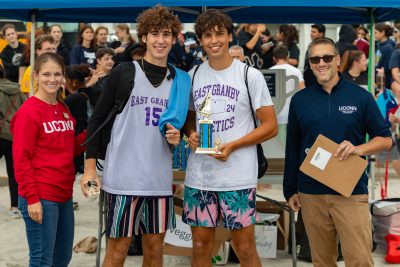
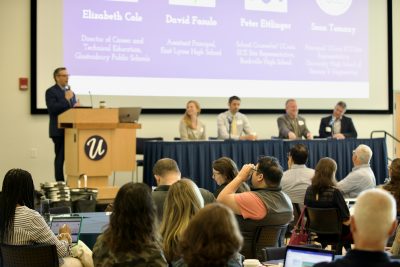 kicked off with a plenary session focusing on Promising Practices at Partner Schools. Representatives from Glastonbury Public Schools, East Lyme High School, Rockville High School and University High School of Science and Engineering discussed ways they are expanding their concurrent and dual enrollment opportunities at their schools. They shared an approach that focused on creating diverse course offerings to meet the unique needs of their high school populations. Site Representatives attended breakout sessions which focused on high school specific program data, expanding access to course offerings, registration 101, a Q&A with a panel of former UConn ECE students, and information from UConn’s Center for Students with Disabilities. The conference ended with a barbecue lunch on the Student Union Terrace for attendees to enjoy a beautiful, sunny day on the Storrs campus. We look forward to having everyone back on the Storrs campus next year.
kicked off with a plenary session focusing on Promising Practices at Partner Schools. Representatives from Glastonbury Public Schools, East Lyme High School, Rockville High School and University High School of Science and Engineering discussed ways they are expanding their concurrent and dual enrollment opportunities at their schools. They shared an approach that focused on creating diverse course offerings to meet the unique needs of their high school populations. Site Representatives attended breakout sessions which focused on high school specific program data, expanding access to course offerings, registration 101, a Q&A with a panel of former UConn ECE students, and information from UConn’s Center for Students with Disabilities. The conference ended with a barbecue lunch on the Student Union Terrace for attendees to enjoy a beautiful, sunny day on the Storrs campus. We look forward to having everyone back on the Storrs campus next year.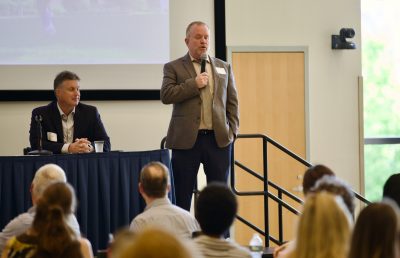
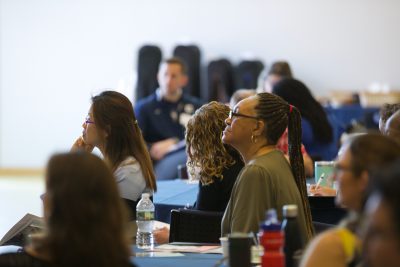
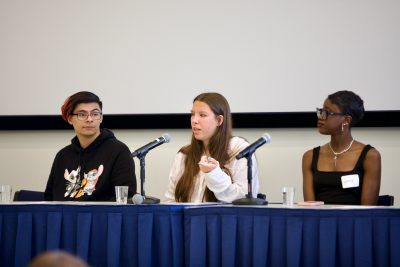
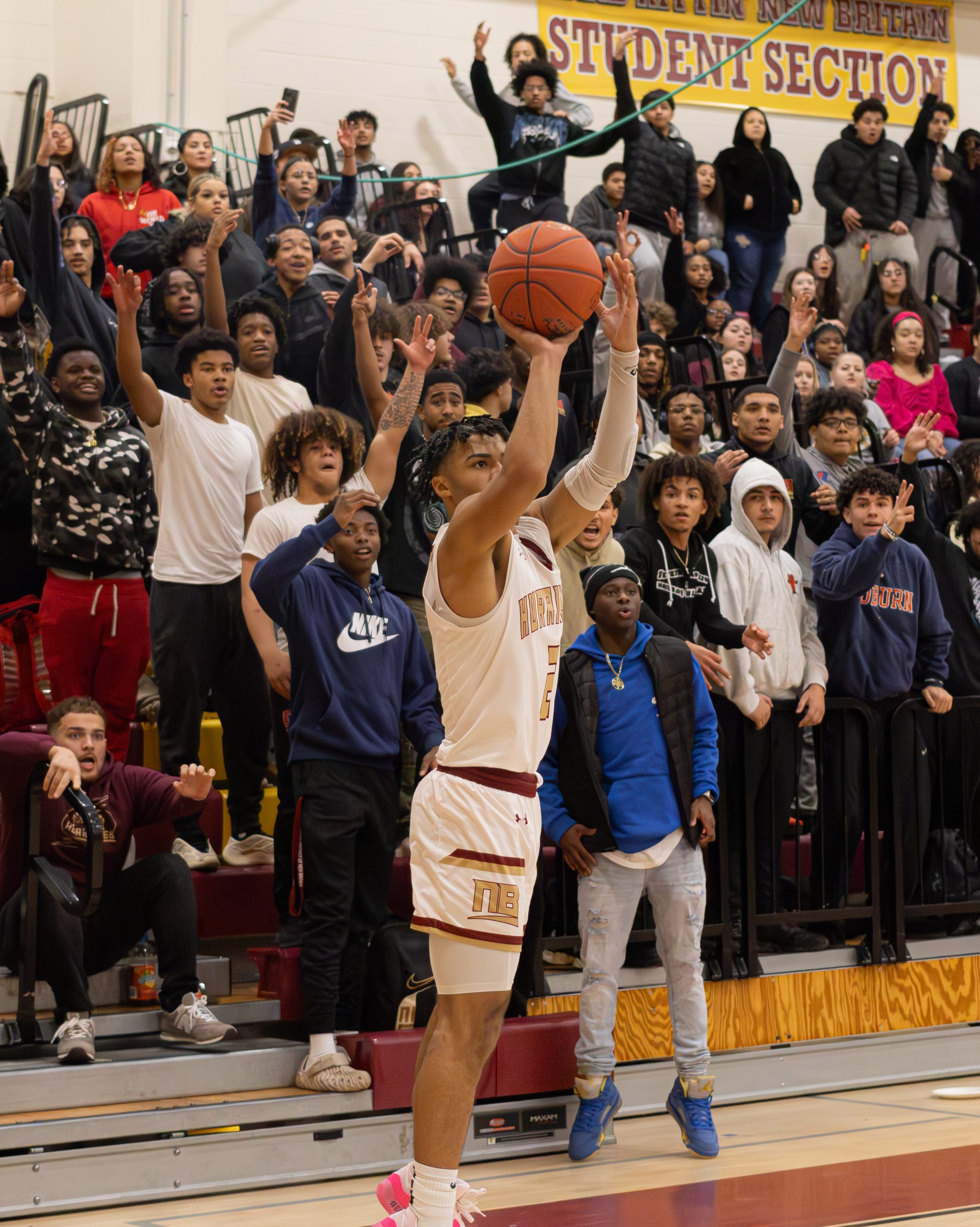
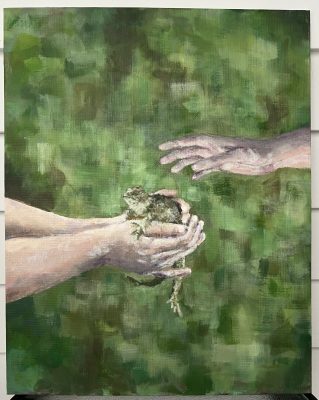

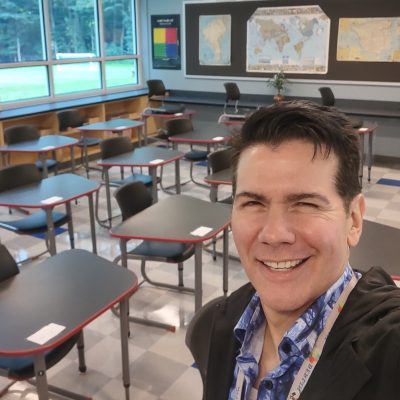 Conversation: Cultural Topics, since 2012. His unique gift to ECE classrooms was bringing alive the language, culture, and history through his storytelling based on his extensive travel experiences in the Hispanic and Portuguese worlds, and his Chilean heritage. In his retirement, Mr. Lewis will move on to his third career teaching Buddhist philosophy and practice, and eventually living part time in the White Mountains and in Chile.
Conversation: Cultural Topics, since 2012. His unique gift to ECE classrooms was bringing alive the language, culture, and history through his storytelling based on his extensive travel experiences in the Hispanic and Portuguese worlds, and his Chilean heritage. In his retirement, Mr. Lewis will move on to his third career teaching Buddhist philosophy and practice, and eventually living part time in the White Mountains and in Chile.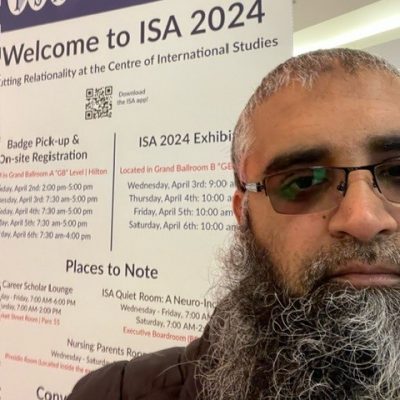 International Studies Association Annual Conference in San Francisco, CA in April, where he presented a research paper on Nationalism and identities in South Asia, an article version of his dissertation. He also co-presented on forming national identities, mass culture, and land rights. Dr. Rafiq was able to attend several sessions, including foreign policies, using role theory and Arab Spring 2.0, and civil war research.
International Studies Association Annual Conference in San Francisco, CA in April, where he presented a research paper on Nationalism and identities in South Asia, an article version of his dissertation. He also co-presented on forming national identities, mass culture, and land rights. Dr. Rafiq was able to attend several sessions, including foreign policies, using role theory and Arab Spring 2.0, and civil war research.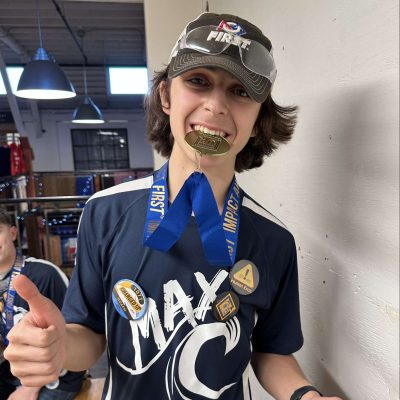
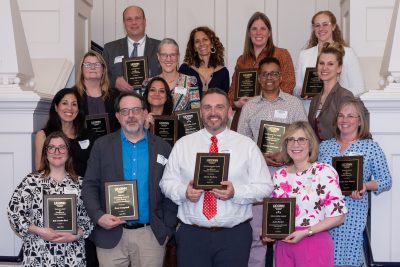
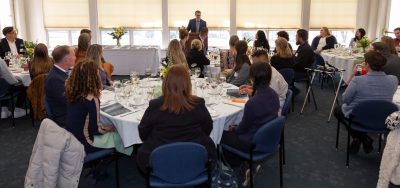 ear we had the great honor to recognize thirteen Professional Recognition Award winners along with six award winners of the Silver Jubilee Award (25-year partners). The night was filled with heartfelt speeches, tears of joy, laughter, and celebration as winners, accompanied by their family and friends were able to pause and acknowledge the great impact they have on the lives of their students, their community, and those who work alongside them.
ear we had the great honor to recognize thirteen Professional Recognition Award winners along with six award winners of the Silver Jubilee Award (25-year partners). The night was filled with heartfelt speeches, tears of joy, laughter, and celebration as winners, accompanied by their family and friends were able to pause and acknowledge the great impact they have on the lives of their students, their community, and those who work alongside them.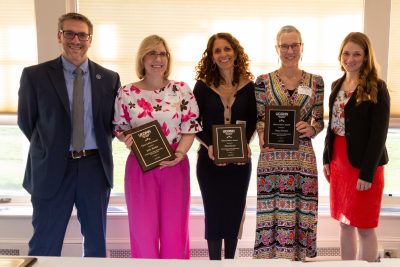
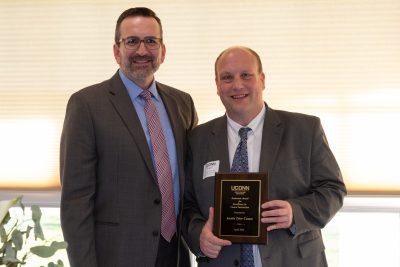
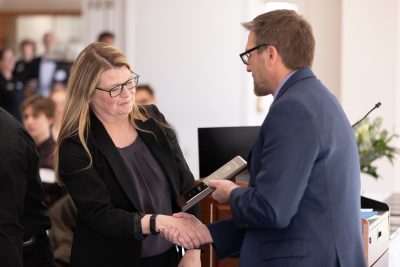
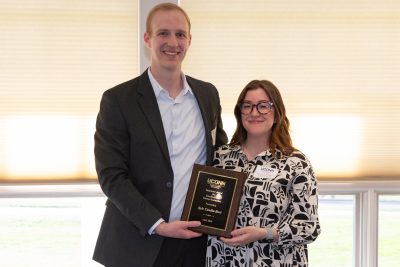
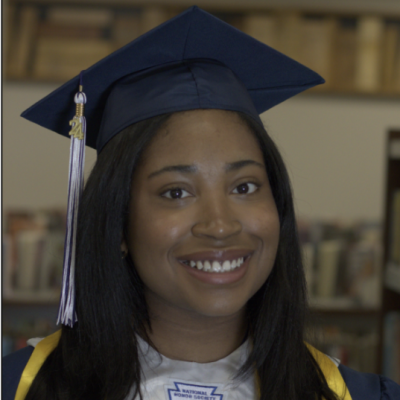
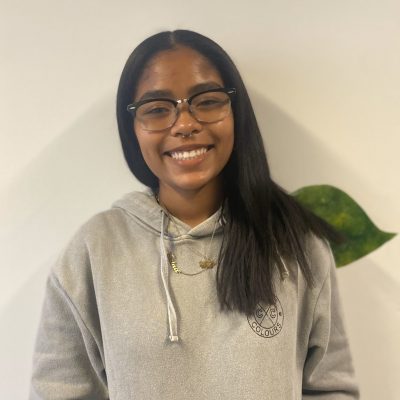
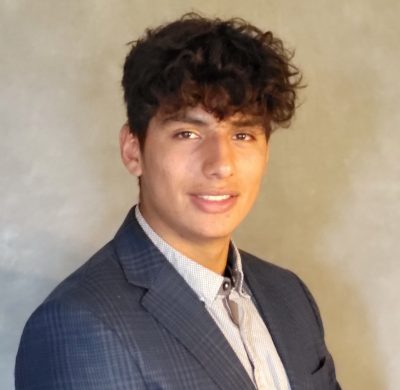

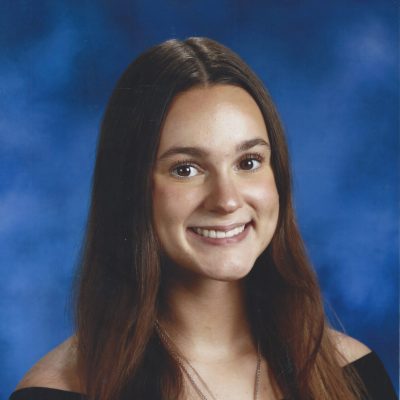
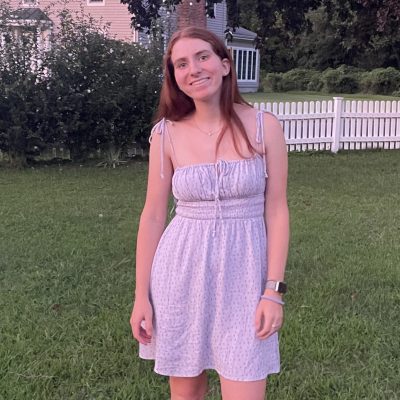
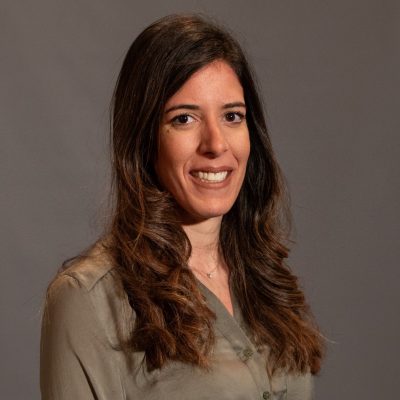


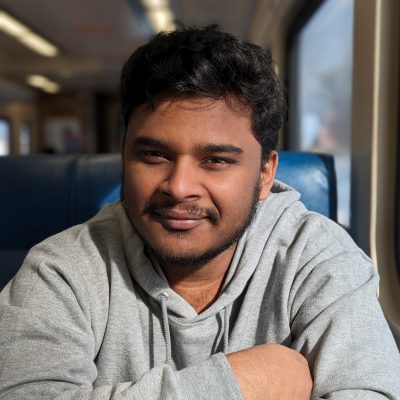

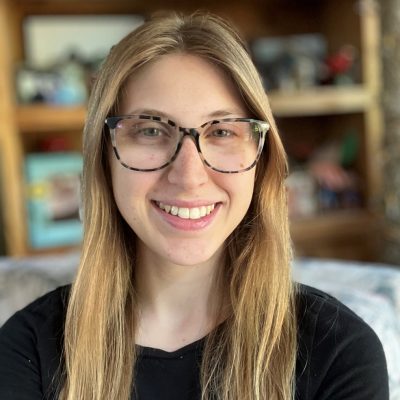
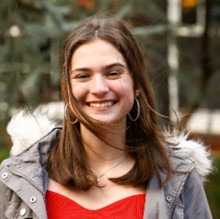

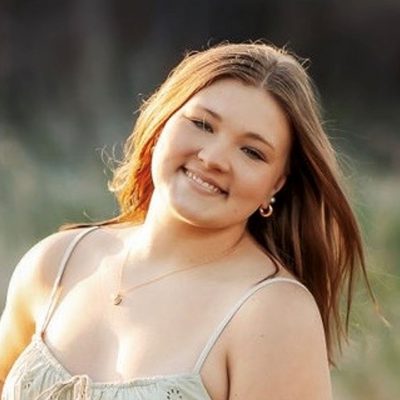


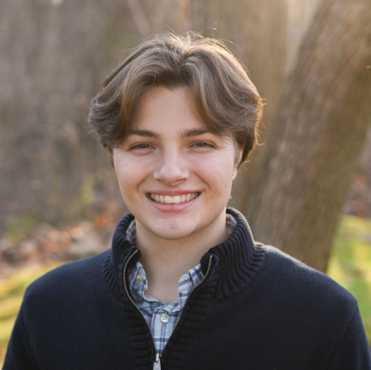

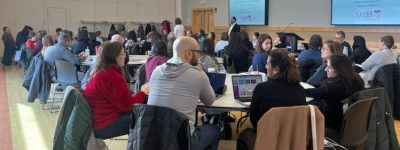 UConn ECE Faculty Coordinators from Spanish, Profs. Gustavo Nanclares and Eduardo Urios-Aparisi met with more than 60 Spanish Instructors to listen to Prof. Maria Acosta Cruz, Professor of Spanish in the Language, Literature & Culture Dept at Clark University. Prof. Acosta shared her talk “Ecocrítica, cultura y nación: La cultura puertorriqueña a través de cinco siglos” (“Ecocriticism, Culture, and Nation: Puerto Rican Culture Through Five Centuries”) with the teachers.
UConn ECE Faculty Coordinators from Spanish, Profs. Gustavo Nanclares and Eduardo Urios-Aparisi met with more than 60 Spanish Instructors to listen to Prof. Maria Acosta Cruz, Professor of Spanish in the Language, Literature & Culture Dept at Clark University. Prof. Acosta shared her talk “Ecocrítica, cultura y nación: La cultura puertorriqueña a través de cinco siglos” (“Ecocriticism, Culture, and Nation: Puerto Rican Culture Through Five Centuries”) with the teachers.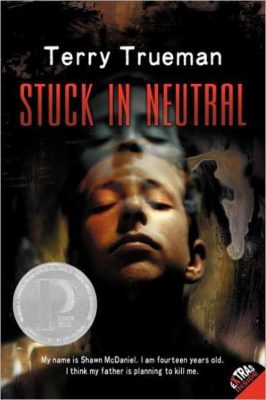
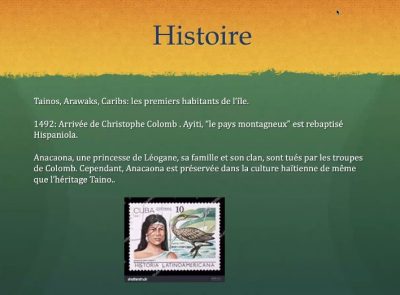 UConn ECE Faculty Coordinator from French, Prof. Florence Marsal met with 30 UConn ECE certified French Instructors to hear from Joëlle Vitiello, Professor of French and Francophone Studies at Macalester College for her talk “Enseigner les trésors d’Haïti” (“Teaching the Treasures of Haiti”). In addition, Mary Catherine Decoteau, Career Consultant from UConn’s Career Services, spoke to teachers about enhancing and highlighting career competencies in UConn French courses.
UConn ECE Faculty Coordinator from French, Prof. Florence Marsal met with 30 UConn ECE certified French Instructors to hear from Joëlle Vitiello, Professor of French and Francophone Studies at Macalester College for her talk “Enseigner les trésors d’Haïti” (“Teaching the Treasures of Haiti”). In addition, Mary Catherine Decoteau, Career Consultant from UConn’s Career Services, spoke to teachers about enhancing and highlighting career competencies in UConn French courses.